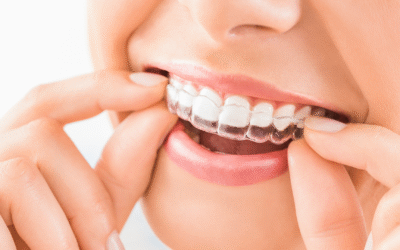Sports are exciting, healthy, and fun, but accidents happen. A ball, elbow, or fall can damage your teeth in seconds. The good news? Wearing a mouthguard is one of the easiest and most effective ways to protect your smile and support your overall oral health and general health.
Whether you’re about to get braces, wearing them now, or just finished treatment, here’s why a mouthguard is so important, and which kind works best at each stage, straight from your trusted board-certified orthodontist.
Why Athletes Need Mouthguards
Research shows athletes who don’t wear mouthguards are twice as likely to have dental injuries. A good mouthguard can:
- Protect teeth from chips, cracks, or being knocked out
- Prevent cuts inside your lips and cheeks (especially with braces!)
- Save you from painful emergencies and extra orthodontic visits
- Shorten recovery time if an accident happens
Dentists, orthodontists, and sports dentistry experts all recommend mouthguards for contact and collision sports (like football, basketball, hockey, wrestling, and soccer) and many suggest them for activities with fall risks too, like gymnastics, skateboarding, or biking.
If you wear Invisalign aligners, that may be acceptable for some sports. However, athletes that play impact sports like football, boxing, etc. should wear a sports mouthguard over their aligners. For best results, ask your Invisalign orthodontist which option is safest for your smile.
Before Braces: Start Strong
If you’re planning braces soon and play sports, it’s smart to get a mouthguard now.
Best choice: A custom-fit guard from your dentist or orthodontist office. It’s comfortable, protective, and stays put.
Second choice: A high-quality “boil-and-bite” guard from a store. Better than nothing, but may need replacing once braces go on.
Think of it as a head start on protecting your smile before orthodontic changes begin. Talking with a braces orthodontist can help you find the best fit for your needs.
During Braces: Extra Protection Needed
Braces add brackets and wires, which can make sports injuries worse if you’re hit in the mouth. The right mouthguard protects both your teeth and your braces.
- Custom orthodontic mouthguards (made by your orthodontist) are the gold standard. They fit over braces comfortably and give the best protection.
- Braces-specific boil-and-bite guards (sold in stores) are designed with extra room for brackets and can work if a custom guard isn’t available.
- Avoid “one-size-fits-all” stock guards. They don’t stay in place well and won’t give enough protection.
Without a guard, even a small bump can mean broken brackets, cuts inside your mouth, or damage to your teeth.
After Braces: Keep It Up
Once the braces come off, your teeth have shifted into their new positions, and your old mouthguard likely won’t fit anymore. Time for a new one!
- Custom guards are again the best choice for comfort and protection.
- If you’re wearing a retainer, don’t put a regular mouthguard over it unless your orthodontist makes one designed for that. Patients who are wearing retainers or finishing treatment with retainers should ask about safe options to protect their new smile.
Your new smile deserves protection long after treatment ends.
Caring for Your Mouthguard
A clean, well-kept mouthguard = better protection and fewer germs.
- Rinse with cool water after every use
- Brush gently with a soft toothbrush (no toothpaste)
- Store in a ventilated case, not a closed bag
- Replace when it’s worn out, cracked, or no longer fits

What If an Injury Happens?
Even with a mouthguard, accidents can happen. Here’s what to do:
- Knocked-out tooth: Pick it up by the crown (top part), rinse gently, and place it back in the socket if you can. If not, keep it in milk and get to a dentist right away.
- Broken or loose tooth: Call your dentist immediately.
- Broken braces/wires: Use orthodontic wax to cover sharp spots and contact your orthodontist.
The faster you act, the better the outcome. Immediate care can also prevent TMD/TMJ pain or longer-term malocclusion and TMJ complications.
Key Takeaways
- Mouthguards protect your teeth, braces, and smile before, during, and after orthodontic treatment.
- Custom-fit guards give the best comfort and protection, but even a braces-safe boil-and-bite is better than nothing.
- Replace worn or ill-fitting mouthguards and clean them daily.
- Think of a mouthguard as an “insurance policy” for your smile. One small step now saves a lot of pain, time, and money later.
If you or your child play sports, ask us about getting fitted for a custom orthodontic mouthguard at our Rochester location. From comprehensive orthodontic treatment and functional orthodontics to advanced solutions like indirect bonding braces or a maxillary skeletal expander, our team of orthodontist experts is here to protect your smile during every stage of treatment.
Whether you need a braces orthodontist, are interested in functional brace teeth, or require orofacial pain treatment in Rochester MI, our team can help. Contact us today and trust a leading orthodontist practice to keep your smile safe and strong.




